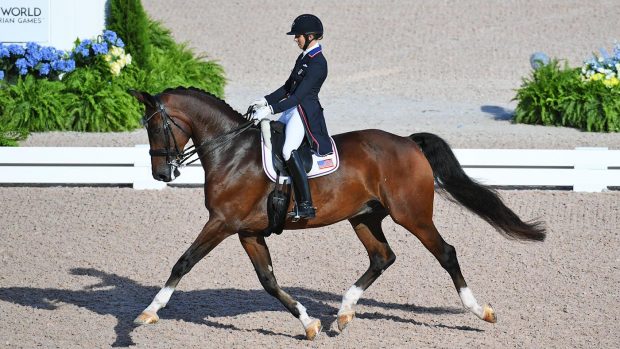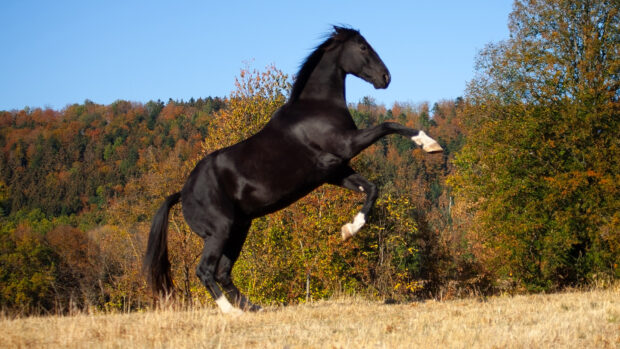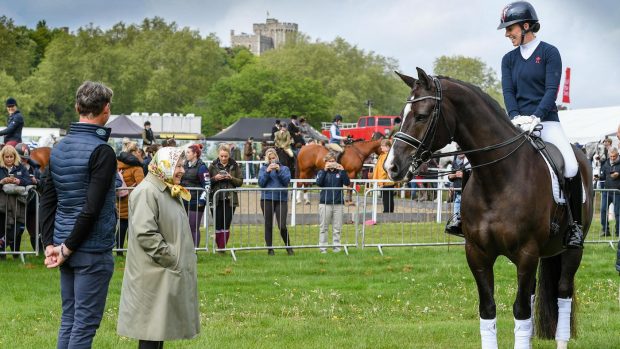Triple Tokyo Paralympic medallist Natasha Baker shared a powerful message of unity and inclusion following her silver medal-winning freestyle performance aboard Keystone Dawn Chorus (“Lottie”).
Natasha, who had already won five gold medals across the London 2012 and Rio 2016 Paralympics before adding to her tally in Tokyo, was reflecting on the platform the Games provides to help drive change in both the sporting and wider world.
“Everybody is different and it would be such a boring world if everybody was the same,” said Natasha, who wore gloves sporting a hand-drawn WeThe15 logo for her Tokyo performances.
“We need to embrace each other’s differences, whether that be race, sexuality, disability. Everybody is different. Everybody has strengths, everybody has weaknesses. I think in the past, it’s just been brushed under the carpet – people are too scared to confront people with disabilities, they don’t know how to approach us and this is such an incredible platform to spread that message from.
“I think the Paralympics especially shows that actually, it’s not about disability it is about ability and the things that disabled people can go out and achieve with determination, with hard work. It shows that we are human beings.
“Disability needs to be seen as equal. We deserve that right to be able to travel as able-bodied people travel, to be spoken to as able-bodied people are spoken to. And, unfortunately, it isn’t the case.”
“And so [the Paralympics is] such an incredible platform to really speak out, spread the awareness of disability, and ableism – and actually how damaging that can be to disabled people.”
Natasha praised the increased coverage of the Games this year, particularly by Channel 4, but added increased coverage of disability sport in general is still needed.
“Everybody loves watching Paralympic sports and that only really comes around every four years,” she said. “We need to see people with disabilities on the TV more. We need to see Paralympic sport more for people to be able to invest into it and to really for them to feel like they know us on a more personal level.
“I think we’re making steps towards that, but there’s still too much of a gap, and that needs to be closed.”
Looking within the horse world, Natasha echoed Sir Lee Pearson’s call for para equestrian sport to be included in major show’s programmes.
“I really want to see the the Paralympic movement coming more in line with the Olympic movement,” she said, calling on major show organisers to include para riders in their programmes.
“We need to be at more able-bodied shows, We need to be more inclusive, we want that recognition. We want to be out there; they can’t be scared of us para dressage riders. We want to be put into these bigger atmospheres. Lottie had never seen like a quarter of [what she’s experienced in Tokyo] – I think the biggest arena she’d been in was Hartpury and that’s nothing compared to this.
“We need more exposure. That’s what we want, and I think the UK shows do need to take that on board and take more responsibility and schedule us in.”
Natasha added this was an area she pushed on when she had time owing to a lull between horses, and is something she is keen to pick back up and “really champion”.
“We just want to be involved in it and I think that’s also when we’ll get more sponsors and more owners interested, because there’s more accessibility to our sport,” she said.
“It’s really hard to get para owners when we’re not out there enough. My owners are incredibly supportive but unfortunately they couldn’t be here [in Japan], so we want to give back to them in other ways.”
She added giving para horse owners the opportunity to watch their horses at those bigger shows is not only supportive of those already in the game, but has the potential to bring in new investors.
“That is then going to open other people’s eyes, who maybe haven’t seen para dressage before and think ‘I really want to be involved in that’ or ‘I’ve got an able bodied horse that actually isn’t going to make it to the next level, but they could go to Paris and win a medal out there’, said Natasha.
“That’s what we need to develop in our country a lot more and that’s not going to happen until we get out there more and start spreading the message.”
Natasha remembers how she was inspired by watching the British riders at the 2000 Sydney Games and the impact that visibility has had on her own life.
“I said ‘if they can do it, then I can do it’,” she said. “If you set your mind to something, and you want it, there’s absolutely nothing holding you back from going out and achieving that.”
You might also be interested in:

‘Love has to prevail’: Sir Lee Pearson shares powerful message of hope and acceptance following historic 12th Paralympic gold win

The magic of the horse-human connection: Sophie Wells on why equestrian sport’s Paralympic place is so important

Subscribe to Horse & Hound magazine today – and enjoy unlimited website access all year round

Using sport to kick-start change: WeThe15 campaign launched to end disability discrimination

Para riders call for major change on support for disabled people
Horse & Hound magazine, out every Thursday, is packed with all the latest news and reports, as well as interviews, specials, nostalgia, vet and training advice. Find how you can enjoy the magazine delivered to your door every week, plus options to upgrade your subscription to access our online service that brings you breaking news and reports as well as other benefits.




